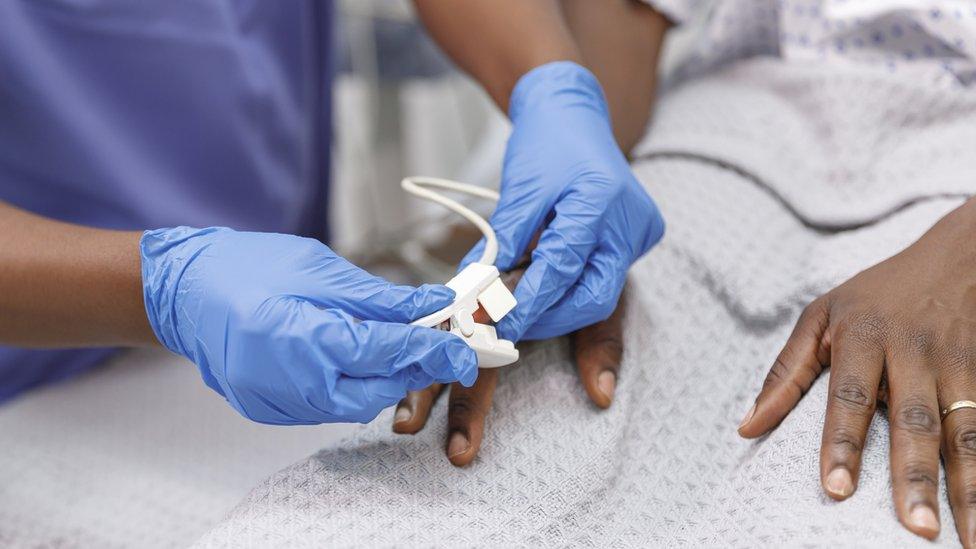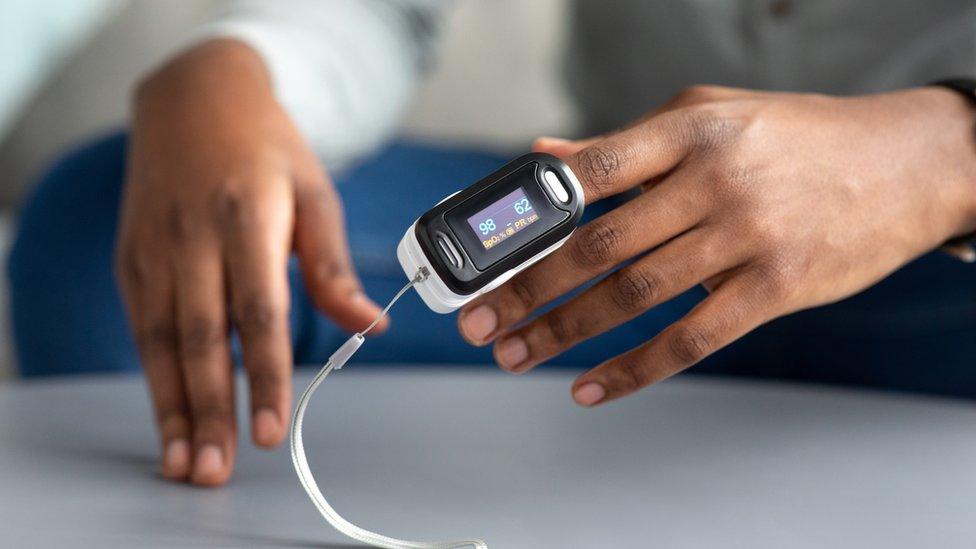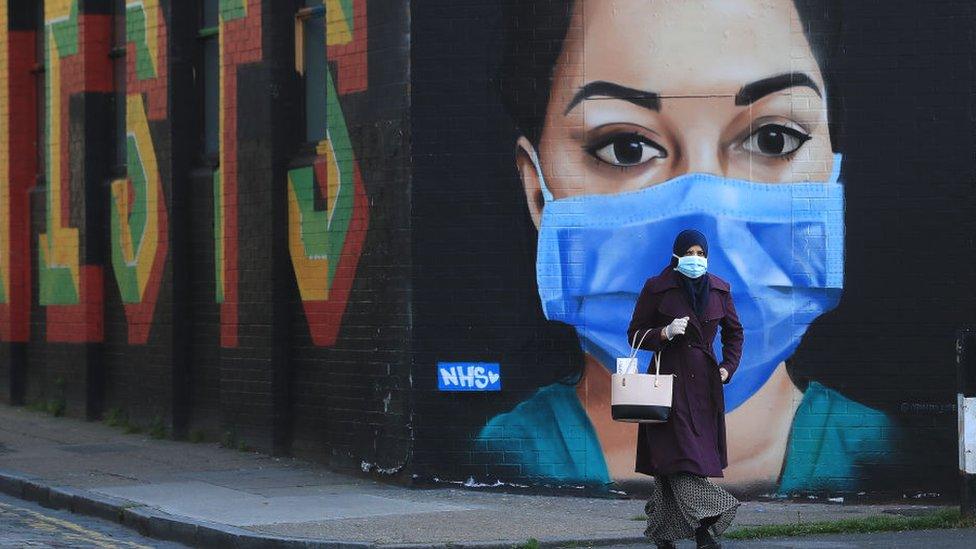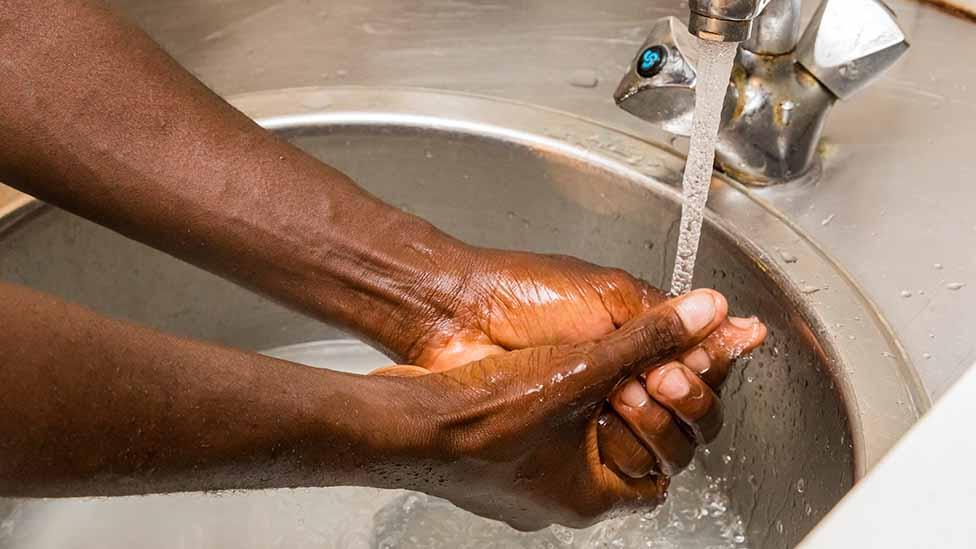Covid: Sajid Javid orders review of medical device racial bias
- Published
Health Secretary Sajid Javid: Racial bias in a medical instrument ''cannot be acceptable at any level''
A review into whether medical devices are equally effective regardless of the patient's ethnicity has been ordered by Health Secretary Sajid Javid.
Research suggests oximeters, which are clipped to a person's finger, can overstate the level of oxygen in the blood of people from ethnic minorities.
Ministers want to know whether bias could have prevented patients receiving appropriate Covid treatment.
Mr Javid said any bias was "totally unacceptable".
But the doctors' union the British Medical Association (BMA) said the review should not simply look at equipment, but also "structural issues" within healthcare that affect ethnic minorities.
Evidence suggests people belonging to ethnic minorities have been at greater risk from Covid during the pandemic.
A study published last year indicated that black people were twice as likely as white people to catch coronavirus. People of Asian heritage were 1.5 times more likely than their white counterparts to be infected, research suggested.
But the reasons why are not yet fully understood. Structural racism and social inequality have been suggested as factors, as well as links to housing, occupation and underlying health conditions.
Mr Javid announced the review in the Sunday Times, external, saying he was determined to "close the chasms that the pandemic has exposed".
Asked later on the BBC's Andrew Marr show whether he thought people had died of Covid because of pulse oximeters, Mr Javid said: "I think possibly yes, yes. I don't have the full facts."
He said there was racial bias in some medical instruments, adding: "It's unintentional but it exists."
"And the reason is that a lot of these medical devices, even some of the drugs, some of the procedures, some of the textbooks, most of them are put together in majority white countries and I think this is a systemic issue around this," he said.

Dr Michael Sjoding, from the University of Michigan, who led a study looking at the potential racial bias in pulse oximeters, described the "significant discrepancy" in the device's accuracy when used on patients with a darker skin tone as "a small difference but clinically meaningful".
He told BBC News the study found that "at least twice, perhaps three times as often, the device is less accurate on black patients".
He said in the immediate future, doctors needed to be aware of the oximeters "limitations" and to be careful about using it without considering other information.
But in the longer term, he said the device should be redesigned "so they work the same in all patients" and urged governments around the world to "set a new standard" with regard to regulating and evaluating the efficacy of medical devices.
The BMA's Dr Anil Jain told the BBC that the review in the UK "shouldn't be limited to just pulse oximeters" and should also look at other medical devices, such as personal protective equipment (PPE), which he said was sometimes inadequate or inappropriate for people from ethnic minorities.
It should also "look at structural issues that might have led to the disparities that ethnic minorities as well as communities have faced", he added.
Allow YouTube content?
This article contains content provided by Google YouTube. We ask for your permission before anything is loaded, as they may be using cookies and other technologies. You may want to read Google’s cookie policy, external and privacy policy, external before accepting. To view this content choose ‘accept and continue’.
Earlier this year an NHS report recommended an urgent review into the use of pulse oximeters, with experts saying it works less well in those with darker skin.
The devices beam light through the blood, and skin pigmentation may affect how light is absorbed, said NHS England and medicines regulator, the MHRA.
Guidance was updated for patients from black, Asian and other ethnic minority groups, saying they should continue using pulse oximeters but seek advice from a healthcare professional.
Dr Habib Naqvi, who leads the NHS Race and Health Observatory, which looks at how people's race impacts their health, told the BBC: "It's absolutely crucial that those who use pulse oximeters in their practice or provide them to the public take skin pigmentation into account when considering effectiveness among users.
"This is not to say pulse oximeters are bad. What we are saying is that more care needs to be taken when looking at the readings from these devices."
An independent chairman to lead the review is yet to be appointed, but the initial findings are expected by the end of January.

THE NEW LABOUR REVOLUTION: Two powerful personalities at the heart of a political phenomenon
FROM TOM HANKS TO EMMA THOMPSON: Check out the great films on BBC iPlayer

Related topics
- Published31 July 2021

- Published13 June 2020

- Published12 April 2020

- Published17 June 2020

- Published19 June 2020
